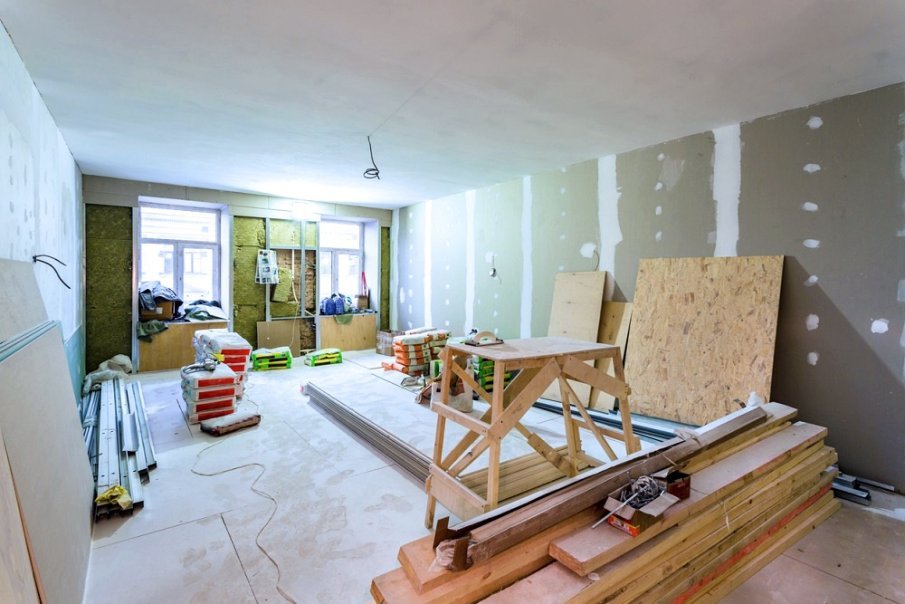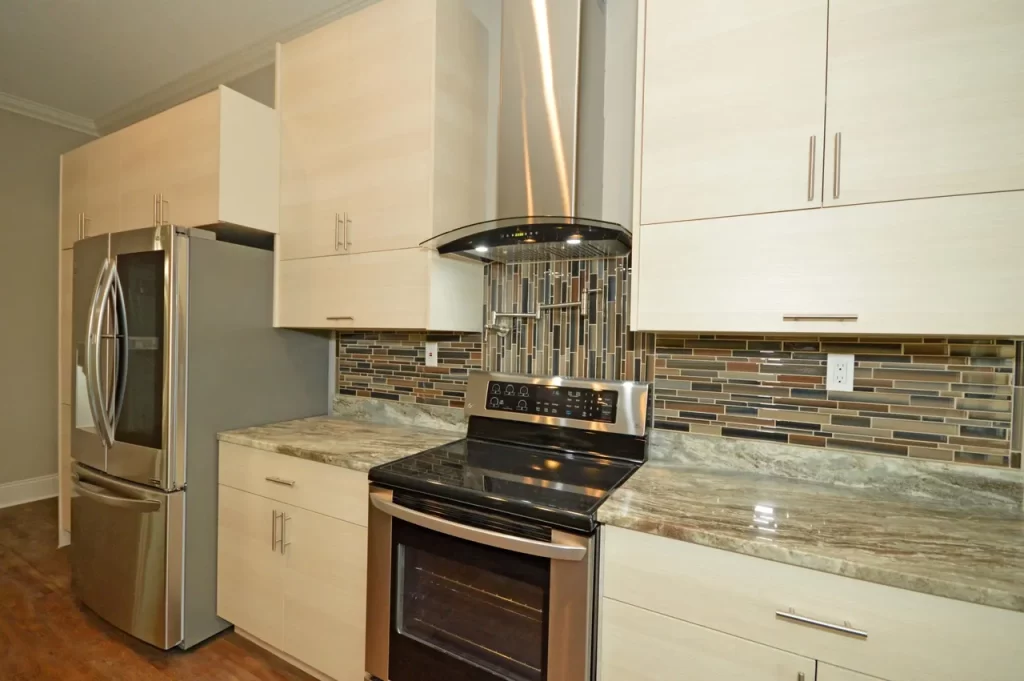Kitchen remodeling is one of the most exciting — and stressful — home improvement projects homeowners undertake. Whether you’re planning a sleek modern redesign or restoring a classic kitchen, timing is everything. So, how long does a kitchen remodel take? While there’s no one-size-fits-all answer, this guide breaks down every phase of the process, helping you set realistic expectations and avoid costly surprises.
Understanding the Kitchen Remodel Timeline
The first step to managing your kitchen remodel is understanding what influences the timeline. Several factors come into play: the size of your kitchen, the extent of the changes, the availability of contractors and materials, and, of course, your budget.
Why Timelines Vary So Much
It’s easy to see glossy kitchen makeovers on TV done in a week and think that’s the norm — but those are carefully staged. In reality, kitchen remodels can take anywhere from 6 weeks to 6 months. The difference lies in the details.
Scope of Work Matters
- Minor Remodel (6-8 weeks): Includes cabinet repainting, hardware changes, and new appliances.
- Moderate Remodel (8-12 weeks): New countertops, cabinets, flooring, and partial layout changes.
- Major Remodel (12-24 weeks+): Complete demolition, layout reconfiguration, new plumbing, electrical, and custom-built features.
Kitchen Remodel: Pre-Planning Phase
Before any physical work begins, pre-planning lays the foundation. This stage might not seem exciting, but skipping it can derail your entire project.
Initial Consultations and Design (2-4 Weeks)
Start by hiring a kitchen designer or contractor. Collaborate on ideas, layout options, and functionality. Expect several meetings to finalize the design and select materials.
Permits and Approvals (1-3 Weeks)
Depending on the complexity of your remodel, you’ll likely need permits. This includes plumbing, electrical, and structural changes. Getting these approvals can slow down the process, especially if your local building department is backlogged.
Product Ordering and Delivery (4-6 Weeks)
Appliances, cabinetry, and countertops are often custom-ordered. Lead times vary wildly — for example, high-end appliances or custom cabinets can take 8+ weeks to arrive.
Demolition and Structural Work
Once materials start arriving and permits are approved, it’s time to swing the sledgehammer.
Demolition (1 Week)
Removing old cabinetry, tearing out flooring, and opening walls goes quickly. But surprises — like mold, outdated wiring, or water damage — can extend this timeline.
Rough-In Work: Plumbing and Electrical (1-2 Weeks)
If you’re moving sinks, ovens, or lighting, this is when plumbing and wiring are updated. Your remodel may require coordination between electricians, plumbers, and HVAC technicians.
Building the New Kitchen
With the dirty work behind you, the heart of the remodel begins.
Framing and Drywall (1-2 Weeks)
Walls are rebuilt or patched, and drywall is installed and painted. It’s a dusty, but essential, process to prep the room for finishes.
Flooring Installation (1 Week)
Hardwood, tile, or vinyl plank floors are installed at this stage. Proper subfloor preparation is crucial and can take additional time.
Cabinet and Countertop Installation (2-4 Weeks)
Cabinet installation is precise and often painstaking. Countertops — especially stone — require templates after cabinets are set, then a waiting period for fabrication before installation.
Backsplash and Painting (1 Week)
With countertops in, it’s time for finishing touches like backsplashes and painting the walls. These details may seem minor but can significantly impact the look and feel.
Appliance and Fixture Installation
Bringing the kitchen to life involves connecting all the final pieces.
Appliance Hook-Up (1-2 Days)
Your oven, refrigerator, dishwasher, and range hood are installed and tested. If gas lines or ventilation ducts need adjustments, that could stretch this out.
Plumbing and Lighting Fixtures (1-3 Days)
Faucets, garbage disposals, under-cabinet lighting, and ceiling fixtures are connected, tested, and fine-tuned.
Final Walkthrough and Touch-Ups
You’re almost there — but small details make a big difference.
Final Inspection and Adjustments (1 Week)
Your contractor will walk through the kitchen, looking for imperfections or unfinished tasks. This includes caulking, paint touch-ups, and final cleaning.
Inspections and Compliance
If permits were pulled, a final inspection is often required before officially “closing” the project.
Kitchen Remodel: Total Time Breakdown
Here’s a summarized view of how long each phase typically takes:
| Remodel Stage | Estimated Duration |
|---|---|
| Planning & Design | 2–4 weeks |
| Permits & Material Orders | 4–6 weeks |
| Demolition | 1 week |
| Plumbing & Electrical | 1–2 weeks |
| Drywall & Painting | 1–2 weeks |
| Flooring | 1 week |
| Cabinet & Countertops | 2–4 weeks |
| Fixtures & Appliances | 1 week |
| Final Touches & Inspections | 1 week |
| Total Estimated Time | 8–16 weeks |
How to Speed Up a Kitchen Remodel
Time is money, and delays are the enemy. Here’s how to avoid them:
- Make All Decisions Before Work Starts: Last-minute changes cause costly delays.
- Hire a General Contractor: They’ll coordinate all tradespeople and handle scheduling.
- Order Materials Early: Especially for custom pieces.
- Communicate Clearly: Weekly check-ins help keep everyone aligned.
Make All Decisions Before Work Starts
Finalizing every design choice — from cabinet styles to faucet finishes — before construction begins helps avoid delays. Changing your mind mid-project can lead to reordering materials and rescheduling labor. The more decisions made upfront, the smoother the remodel will flow.
Hire a General Contractor
A skilled general contractor oversees the entire remodeling process, coordinating plumbers, electricians, and other tradespeople efficiently. Their expertise helps prevent scheduling conflicts and ensures each phase transitions smoothly. This centralized management reduces errors and keeps the project on track.
Order Materials Early
Early ordering guarantees that crucial items like custom cabinets, appliances, or specialty tiles arrive on time. Delays in delivery can bring construction to a halt, costing both time and money. By having all materials on-site when needed, you minimize the risk of holdups.
Communicate Clearly
Open and frequent communication with your contractor is vital throughout the project. Regular check-ins help resolve issues quickly, clarify expectations, and adjust timelines if needed. Clear communication keeps everyone aligned and prevents misunderstandings from escalating into major setbacks.
When Delays Are Unavoidable
Sometimes, even the best plans hit snags:
- Supply Chain Issues: A missing part can delay an entire installation.
- Permit Delays: Bureaucracy can slow things to a crawl.
- Unforeseen Damage: Mold, asbestos, or structural issues often come to light after demolition.
Supply Chain Issues
Supply chain disruptions can significantly slow down a kitchen remodel. A single backordered item like a countertop slab or a specialty appliance can hold up the entire installation process. Planning ahead and ordering materials early can help mitigate this common issue.
Permit Delays
Obtaining the necessary permits for plumbing, electrical, or structural changes often involves dealing with slow-moving municipal departments. These delays can prevent work from starting on time or progressing smoothly. Hiring a contractor familiar with local regulations can help expedite the approval process.
Unforeseen Damage
Once demolition begins, hidden problems like mold, asbestos, or water damage may be uncovered. These unexpected issues require immediate attention and repairs, which can add time and cost to the project. While frustrating, addressing these problems ensures the long-term safety and integrity of your kitchen.
Is a Kitchen Remodel Worth the Wait?
Absolutely — your kitchen is the heart of your home. An upgraded, functional, and beautiful kitchen boosts not just your home’s value but also your everyday joy.
FAQs
How long does a kitchen remodel take on average?
Most kitchen remodels take between 8 to 16 weeks depending on the scope, design complexity, and material availability.
Can I live at home during a kitchen remodel?
Yes, but it’s inconvenient. Dust, noise, and lack of access to cooking facilities make temporary kitchens or meal planning essential.
What’s the fastest way to complete a kitchen remodel?
Hire a reputable contractor, plan thoroughly, and avoid changing decisions mid-project. Order materials in advance.
Do I need permits for a kitchen remodel?
Yes, especially if you’re making electrical, plumbing, or structural changes. Check with your local municipality.
Why do custom cabinets delay the project?
Custom cabinets are built to order and can take 6–12 weeks to manufacture and deliver.
What’s the biggest cause of delays in kitchen remodeling?
Material delays and change orders. Deciding to change fixtures, tiles, or layouts mid-project can push back your timeline significantly.




